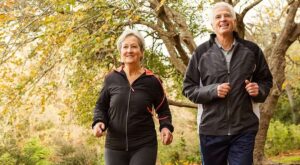 As individuals age, they often experience a natural decline in physical and emotional vitality referred to as old-age weakness. This condition can significantly affect daily activities and overall quality of life. Understanding how to cope with these changes is essential for maintaining health and happiness in later years.
As individuals age, they often experience a natural decline in physical and emotional vitality referred to as old-age weakness. This condition can significantly affect daily activities and overall quality of life. Understanding how to cope with these changes is essential for maintaining health and happiness in later years.
What Is Old-Age Weakness?
Old-age weakness, or geriatric frailty, is characterized by a noticeable decline in physical and mental stamina in elderly adults. This condition stems from the cumulative decline in body systems’ efficiency and resilience, making it harder to perform everyday tasks and recover from routine stressors or acute illnesses.
What Are Physical Symptoms Of Old-Age Weakness?
The physical symptoms of old-age weakness include:
- Reduced Muscle Strength: Decreased muscle mass and strength affect balance, mobility, and the capacity to perform daily tasks independently.
- Fatigue: Increased tiredness and reduced energy levels can significantly limit activity.
- Joint Pain and Stiffness: Degenerative changes in joints make movement painful and difficult.
- Decreased Mobility: A decline in physical ability can lead to difficulty walking, climbing stairs, or standing for extended periods.
What Are Emotional Symptoms Of Old-Age Weakness?
Old-age weakness can also have emotional and psychological symptoms:
- Increased Irritability: Changes in physical health can lead to frustration and irritability.
- Isolation: Physical difficulties can reduce social interactions, leading to loneliness and isolation.
- Depression: Persistent physical ailments and social isolation can increase the risk of depression.
- Cognitive Decline: Apart from affecting physical health, old-age weakness can also impact mental agility, leading to slower thought processes and memory issues.
What Lifestyle Habits Help Seniors Overcome Old-Age Weakness?
Adopting positive lifestyle habits can significantly help seniors manage and overcome symptoms of old-age weakness:
- Regular Physical Activity: Engaging in light exercises like walking, yoga, or tai chi can improve muscle strength, flexibility, and balance.
- Healthy Diet: Eating a balanced diet rich in vitamins, minerals, and antioxidants supports muscle strength and boosts energy levels. Incorporating lean proteins, whole grains, and a variety of fruits and vegetables is beneficial.
- Adequate Sleep: Quality sleep is crucial for recovering from daily fatigue and maintaining overall health.
- Social Interaction: Staying socially active can combat feelings of isolation and depression. Joining clubs, participating in group activities, or regular visits with family and friends can help.
- Mental Exercise: Activities like reading, puzzles, or learning new skills can stimulate the mind and mitigate cognitive decline.
- Regular Check-ups: Routine medical exams help monitor health conditions and quickly address issues that contribute to weakness.
Enhancing Quality of Life in Your Golden Years
Coping with old-age weakness involves addressing both the physical and emotional challenges associated with aging. By integrating regular physical activity, a nutritious diet, adequate sleep, and vibrant social interactions into daily life, seniors can enhance their strength, vitality, and overall well-being. Don’t let old-age weakness define your golden years. Embrace these lifestyle changes to maintain your independence and keep your spirits high.
